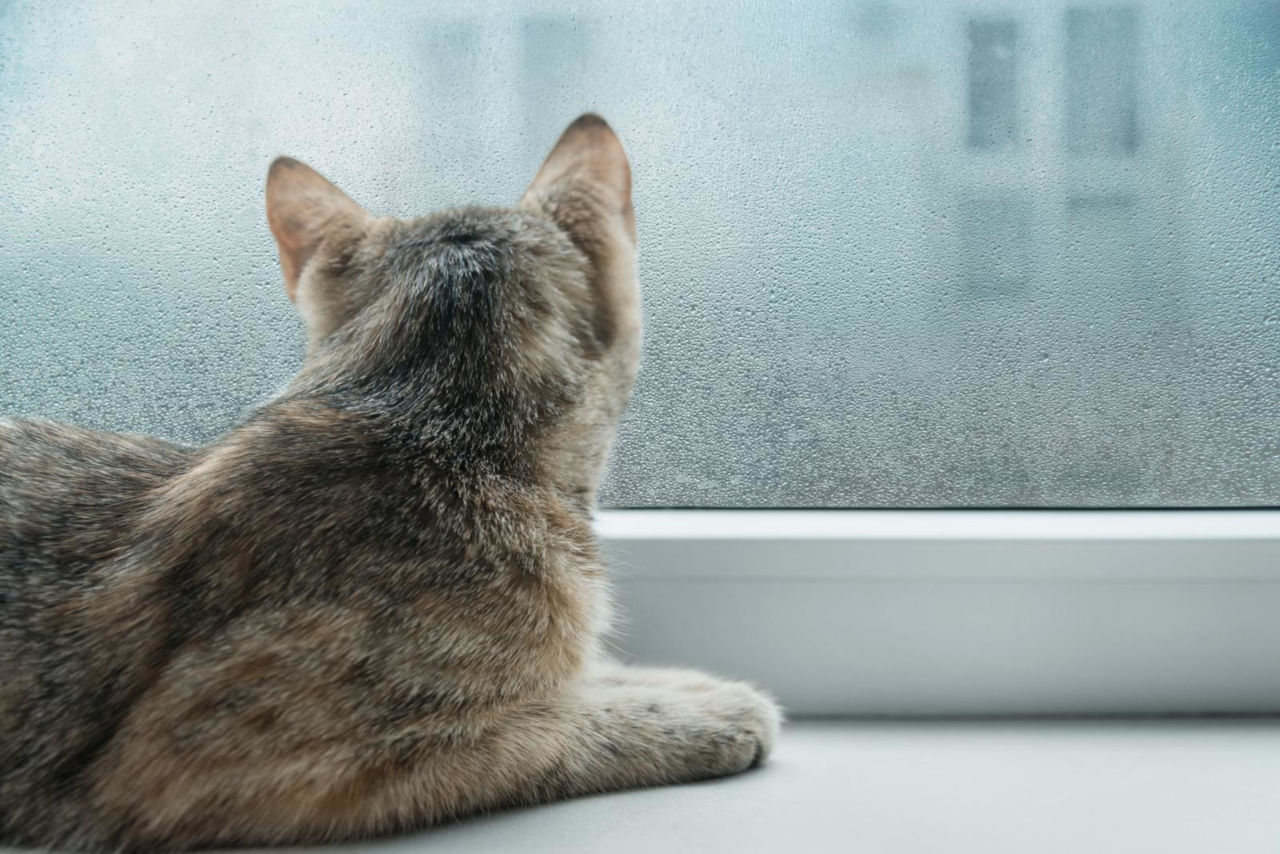Cats can spend countless happy hours staring out the window. Usually, however, this activity is reserved for daytime. During daylight hours, cats enjoy watching humans and other animals go about their business. But why do cats look out the window at night?
A cat that looks out the window at night may lack routine or be awake due to lack of exercise. Perhaps it hopes to be entertained by what it sees. Or perhaps the cat is guarding your house – and thus its territory – or thinking about hunting opportunities. The cat may be in heat and hoping for a nighttime visitor. An older cat may be going senile.
A cat looking out the window at night is rarely a problem. If the cat does so quietly, you should leave it alone to enjoy itself.
However, if the cat is overexcited and keeping you awake, you should find out what is causing this excitement.
Why Do Cats Stare Out of Windows?
Windows are an endless source of entertainment for cats. In fact, it’s been scientifically proven that windows are a major source of enrichment for cats.
However, looking out the window after dark is different from looking out during daylight hours.
It is a common misconception that cats are nocturnal. Cats are crepuscular, which means they are most active at dawn and dusk.
This means that your cat may be looking out the window more often when you wake up. The cat is looking for the stimulation that daybreak brings.
However, some cats stare out the window all night. In theory, this is a harmless habit.
However, it could indicate that something is missing in your cat’s routine. A cat can also become overstimulated by what it sees, hears, or smells, waking you up and keeping you awake.
Ideally, your cat will stick to your schedule and sleep when you do. Then it is unlikely that the cat will keep you awake.
So try to figure out why your cat is looking out the window at night. You can then decide if action is needed.
Routine
Your cat may be looking out the window at night because it lacks a routine.
Cats can spend hours looking out the window. They usually pass the time this way when there is little else to do.
Many cats watch the world while their owners are at work, for example.
If your cat spends these hours of staring out the window at night, he may lack routine and structure in his day.
This can be uncomfortable for cats, as they like to know when they are being fed or played with. A lack of routine can cause stress and anxiety in cats.
Irregular comings and goings can also explain why your cat is looking out the window. For example, if you have teenage children, they may come home late. The cat then looks out for them.
The cat may also be looking for a family member who works shifts. It waits for signs of arrival, such as car doors closing or footsteps.
In these cases, the cat has made watching the windows at night part of its routine.
This is not a problem unless your cat becomes irritable. The cat may become agitated by what she does or does not see. In such cases, you need to break her of this habit to avoid disturbing your night’s rest.
This is easy to achieve. Simply draw the blinds or close the curtains.
However, the cat will soon get bored due to the lack of stimuli. Just be aware that this means the cat will seek entertainment elsewhere.
And the activities she then engages in may not be as peaceful as looking out the window.
Lack of Exercise
Cats spend a lot of time sleeping. When a cat is awake, it is full of energy. This needs to be directed somewhere. Consequently, the cat is looking for stimulation.
If your cat has not exercised enough during the day, it will be restless at night. Looking out the window is a seemingly harmless side effect of this.
After a while, however, the cat will tire of this activity. She will then want to go exploring outside or wake you up for entertainment.
Incorporate an extended playtime into your cat’s routine before bedtime. In conjunction with an evening meal, the cat is then exhausted.
Then the cat will sleep soundly through the night and save looking out the window for the day.
Noise
It is a myth that cats have perfect night vision. Cats cannot see in complete darkness.
However, their night vision is far superior to that of humans. Dim lighting from streetlights or the moon already provides enough light for the cat to see well at night.
This means that your cat will explore any sounds it hears at night. This can be the garbage collection that works at very early hours. Or a bus stopping at the bus stop in front of your house.
It could also be people walking after dark. Or just car doors opening and closing. It could even be your neighbors having a conversation at night.
Sounds excite a cat’s excellent sense of hearing, and it will want to pursue them. Usually, a cat will stop watching once its curiosity is satisfied.
However, if the cat cannot locate the source of the sound, it will continue to stare.
Hunting Instinct
When your cat is awake and alert, its hunting instinct remains heightened. Basically, many cats like to hunt and patrol at night.
Since there is less road traffic and pedestrians then, cats find it easier to hunt using sounds and smells.
Most birds are diurnal, which means they sleep at night. Most birds that are active after dark are actually dangerous to cats, such as owls.
Other prey, such as mice and rodents, may be active at night. Your cat will stare out the window when it hears or smells this possible prey.
Your cat will be frustrated if it smells prey it can’t reach. This behavior needs to be managed just like chirping birds during the day.
Even better is to play hunting games with your cat before bedtime. This will satisfy the predatory instinct until morning.
Keep Watch
Some cats like to act as night watchmen, staring out the window to scare off visitors. In theory, this is very charming.
It seems like a sign that the cat wants to protect its human family.
This is true to a certain extent, but the cat is also protecting its own interests.
Cats work long and hard to establish their own territory. Marking territory usually involves scratching and urinating. Your cat will have marked your property to deter rivals.
However, this does not necessarily deter other cats from visiting the territory. Feral or stray cats, in particular, will be interested.
These cats are always on the lookout for potential food or shelter. If they have reason to believe they will find it on your property, they will look there.
This will not escape your cat’s notice. She will stand guard and try to scare off these intruders. However, this can be problematic.
The cat may be safe in the house, but it will still be agitated. This can lead to unquenched aggression, which she will take out on you.
Generally, strange cats will lose interest in your property if they are not encouraged to stay.
A combination of admonitions from your own pet and your disinterest will be enough to calm your cat.
However, do not allow your cat to confront visitors face to face. This will likely end in a dangerous conflict.
In Heat
Possibly your cat has no aggression, but amorous intentions. If a female cat is not spayed, she will be in heat several times a year. Your cat will then be out to mate around the clock.
This may be especially true after dark. If your cat knows that other cats patrol at night, she will be on the lookout for them.
When it spots a potential mate, it will begin to squawk. This is the cat’s way of announcing that it is available for mating. This is frustrating, but you have to live with it.
The same is true for an unneutered male cat all year round. Until they are neutered, male cats are always looking for mates.
If your male cat smells unneutered females nearby, he will be alert for any sign.
Cognitive Deterioration
If your cat has already reached an advanced age, his cognitive abilities may be declining. This is essentially senility.
Just like vision and hearing, a cat’s brain also deteriorates with age. Cognitive decline usually becomes more pronounced after the age of 15.
A reversed sleep-wake cycle is a common sign of cognitive decline.
Your cat may snooze all day and not engage in normal daytime activities until after dark. She may also become anxious and vocal.
Cognitive decline is as inevitable as it is incurable, but it can be slowed. Above all, you must be patient.
Train your cat, keeping in mind that his memory will be impaired. The more you stimulate your cat’s mind, the more she will become accustomed to her old self.
Summary: Why Do Cats Stare Out the Window at Night?
Cats stare out the window at night for many reasons.
The most common reasons are lack of routine, lack of exercise, noises, the cat’s hunting instinct, keeping awake, and being in heat. In old cats, it also happens that their day-night rhythm is reversed.
So often it is a completely harmless behavior. However, be prepared to intervene and stop the activity if necessary.
An overstimulated cat is the last thing you want after dark.


